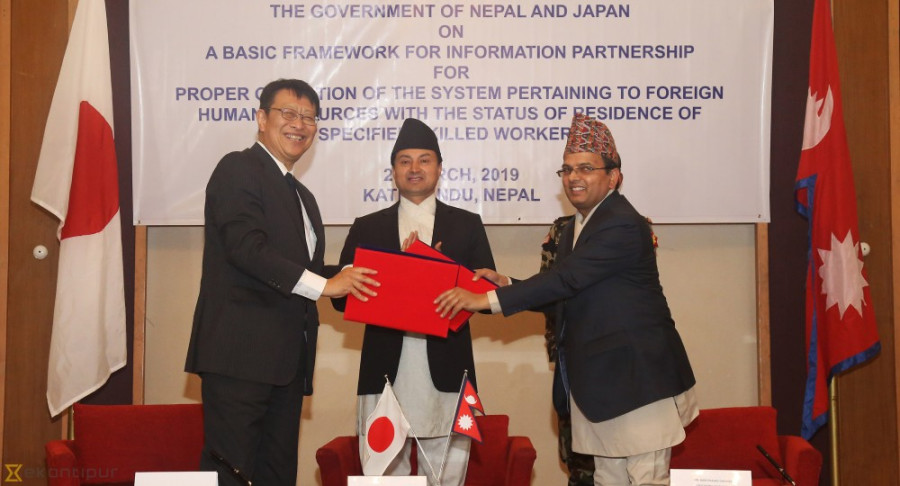National
Japanese language teachers to receive training to teach aspiring Nepali workers
Language centres in the country have been teaching Japanese without any defined modality.
Chandan Kumar Mandal
The teaching method training will be provided to Japanese language teachers from a total of nine countries, including Nepal, from where Japan has decided to hire workers to deal with its acute shortage of workers.
Japan Foundation, the formal body for international cultural exchange, has introduced Japanese teaching methods programme for teachers, who will be training specified skilled workers aspiring to work in Japan.
“The training programme has come as a sub-project for capacity enhancement of language trainers as part of implementing the memorandum signed for labour migration to Japan,” Dipak Dhakal, under secretary at the Ministry of Labour, Employment and Social Security, told the Post.
Nepal was selected among other nine countries when Japan had decided to hire skilled workers in December last year. Nepal and Japan signed the labour agreement in March, opening doors for Nepalis to go work in Japan.
Relaxing its immigration law, Japan had unveiled a plan of hiring nearly 345,000 foreign workers in 14 industrial sectors, including nursing care, janitorial work, manufacturing, hospitality, agriculture and fishing and food processing, for the next five years.
To be eligible to work in Japan, candidates must be proficient in Japanese language and possess expertise in respective sectors.
“Japanese government must have mapped out the condition of language training in Nepal before deciding to train the language teachers,” added Dhakal.
The training programme aims to facilitate Japanese language education for candidates who will be going to work in Japan. Japanese language trainers associated with language institutes, which are registered with the Ministry of Education, will be taken to Japan for training. They will be trained as per the Japan Foundation standards.
During the training phase, trainers will also be introduced with the Japan Foundation Test For Basic Japanese, one of the tests used to examine candidate’s level of Japanese language fluency expected of a candidate for staying in Japan as specified skilled workers.
Since the signing of the labour deal, Japanese language institutes have sprung up across the country. So far, these language centres have been teaching Japanese language to aspirant workers without any defined modality to conduct the language test.
The labour ministry has not yet received any syllabus and modality for Japanese language test, though the tentative dates for language and skill tests have already been scheduled for later this year.
“We have asked the Japanese side to send us the syllabus for language and skill tests during our communications. So far, we have received some sample questions for the skill test, but that’s about it,” added Dhakal.
The Japanese side had said that the aspirant candidates will be expected to demonstrate an A2 level of Japanese language proficiency, which is equivalent to ‘N4’ on the standardised Japanese Language Proficiency Test. With N4 level, which can be achieved with about 300 hours of learning, candidates can understand conversations encountered in day-to-day life.
Besides passing the language proficiency test, aspirant job candidates must also pass the skill test.
“Language institutes have not told the candidates that there will also be a skill test. It has been advertised as if only clearing the test would get them jobs, which is not true,” said Dhakal. “Only a small number of Nepali workers would get to work in Japan because there are nine countries which will be supplying workers to the country.”




 14.24°C Kathmandu
14.24°C Kathmandu















